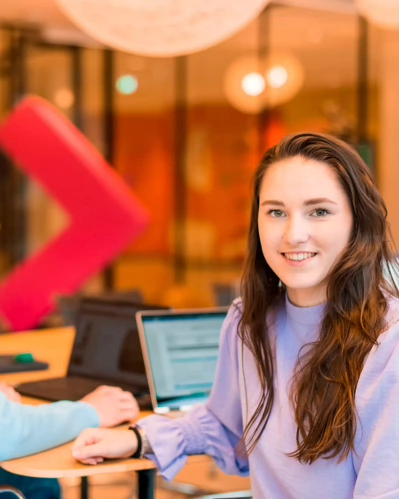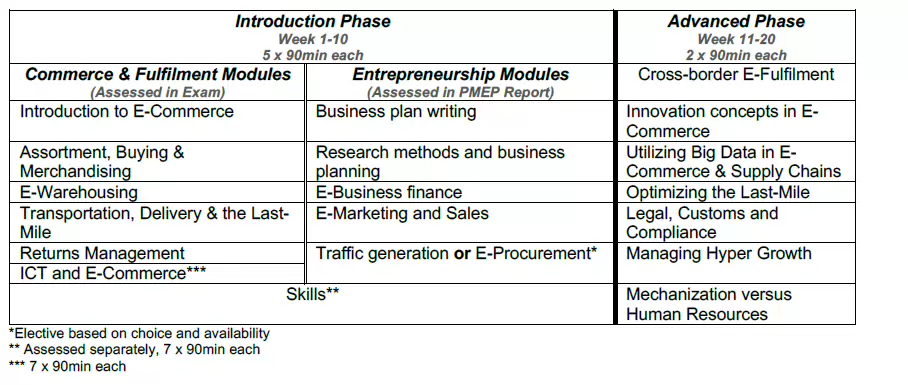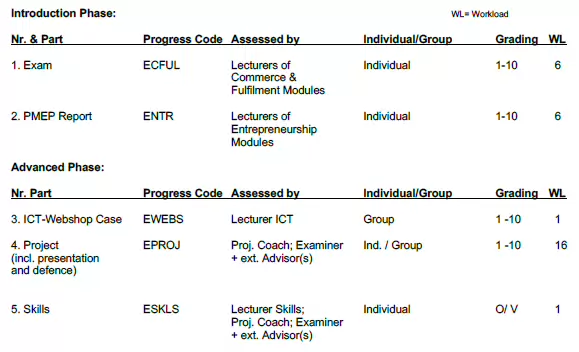
E-Preneurship (E-Commerce & E-Fulfilment) minor regulation
1. Name Minor
Minor E-Preneurship (E-Commerce & E-Fulfilment)
2. English Name
Minor E-Preneurship (E-Commerce & E-Fulfilment)
3. Minor content
“E-Preneurship (E-Commerce & E-Fulfilment)” is a bachelor minor offered by the Institute of Logistics and Technology at Fontys University of Applied Sciences in Venlo since the beginning of 2016. The minor is developed in close cooperation with the Logistics Centre of Expertise Limburg and the Eacademy of Thuiswinkel.org, who is also certifying the minor within their E-Academy programme.Today’s economy is rapidly changing because of the strong growing E-Commerce businesses. Well known examples are Amazon, Zalando, Spotify, Alibaba or Bol.com. The impact of this development is staggering. However, despite of these big players, a lot of successful E-Commerce companies are startups and at the same time many traditional companies are exploring opportunities to integrate ECommerce into their business model. A lot of E-Commerce activities of traditional companies are not making any profit, which is why a lot of attention needs to be paid to the execution of physical goods flows in E-Commerce. A key area of attention in E-commerce is therefore the field of E-Fulfilment (ECommerce
logistics).
Minor E-preneurship
During this minor, students learn how to improve formerly mentioned core processes in E-Commerce & E-Fulfilment and to acquire entrepreneurial competences that help them in making their own (online) business successful. These competences are essential in case of future independency (entrepreneurship) and highly appreciated in corporate management positions (intrapreneurship). Entrepreneurship involves developing a (new) venture. Intrapreneurship, also known as corporate entrepreneurship or corporate venturing, is the practice of developing a (new) venture within an existing organization. Both types of venture creation are focused on exploring new opportunities, business building, in order to create economic value and therefore are of key economic and social importance in modern society.
Therefore, the minor is based upon the three fundamental subjects:
1. E-Commerce “understanding online commerce and relevant activities”
2. E-Fulfilment “creating efficient & effective logistics for online commerce”
3. Entrepreneurship “being capable of starting an own online business”
The introduction phase (week 1-10) provides students with the theoretical basis required to gain more in-depth knowledge about E-commerce & E-Fulfilment. Besides this, students get to know their ‘entrepreneurial self’ by means of a personality test. The results of this test are then used as an aid to provide entrepreneurship-oriented knowledge. Subsequently, students apply the knowledge obtained, as well as skills competences in the advanced phase (week 11-20). They do this by carrying out projects for real E-Commerce companies, or writing a full business plan for their own (future) business idea. In this phase, students are guided by an internal (teacher) and external (company) coach in individual projects. Inspiring guest lecturers by intrapreneurial specialists in E-Commerce and E-Fulfilment are provided in this phase as well to help students obtain practical knowledge with regards to relevant subjects.
Therefore, minor students from diverse domains like Mechatronics, Industrial Product Design,
Information technology, Logistics and other economic studies acquire additional knowledge beyond the scope of their own major. Students from these different majors and different cultural backgrounds will work in interdisciplinary group settings. The official language is English in order to enhance intercultural skills. Furthermore, students obtain more self-awareness, learn from each other’s strengths and work in individual weaknesses. For half a year, the students will be fully occupied. Therefore, the minor is a so called ‘block minor’.
The required study time is 40 hours per week. Approximately on average 12 contact hours and 28 hours of self-study and group work have to be taken into account. In total 30 EC’s are awarded for the completion of this minor.
Goals
At the end of the minor students will have broader knowledge about E-Commerce & E-Fulfilment related subjects, understand the relation between these subjects, and can apply their knowledge in real projects within e-commerce companies. In doing so, they can integrate these fields of knowledge by means of investigating, analysing, improving and developing (new) business opportunities within an international E-Commerce company. Ultimately, a written business plan is presented, with convincingly argumented and defended results.
Summary
The minor offers a framework in which students become E-Commerce & E-Fulfilment professionals and acquire valuable entrepreneurial competences that are in line with the expectations of the industry. Aiming at future entre- or intrapreneurial aspirations, the minor also enhances the students’ creativity, flexibility, reliability, responsibility and guides them towards acting professionally and perform effectively. These are important requirements for achieving success in the emerging world of e-commerce.
4. Admission restrictions to the minor
The spots available for enrolment are restricted to 50 participants for the academic semester at hand. This number can be subject to change over time. The deadline for enrolment is July 1st or November 1st with regards to the first or second semester of each academic year. In case the number of students requesting enrolment exceeds the aforementioned limit, students will be informed through the restrictive functions given by their way of enrolment (e.g. a waiting list spot in ProgRESS; admission closure in Kies op Maat). In case of a waiting list spot, students will be informed about their final admission by July 15th or December 15th respectively. Other admission restrictions do not apply. This is with exception of those mentioned with regards to qualification of a student as given in section 12 of this regulation.
5. Overview of the courses in the minor (see article 12, general section TER)
The total workload for this minor is 30 European credits (ECs), duration is 1 semester. The minor consists of the following (theoretical) modules:

The table above represents the theoretical educational components of the minor. For an overview including application-oriented components (e.g. projects), please go to section 8.
6. Procedure for enrolment of the minor
Minor enrolment follows standard procedures as stated on the Fontys website. There is no required procedure for enrolment for the individual courses of the minor.
7. Tests and procedure for enrolment for the tests (see article 18 & 22, general section TER)
The examination procedure is defined as follows:

In the examination week at the end of the introduction phase, students will be assessed based on two deliverables: A PMEP Report (Nr. 2) assessing the application of the knowledge gathered within all Entrepreneurship modules of the introduction phase (see middle part table section 5.), as well a written exam covering E-Commerce & E-Fulfilment theory (Nr.1; also see left part table section 5.). Those students that do not pass are given a re-assessment at the beginning of the advanced phase. In the advanced phase, students will construct a web shop for their business (Nr. 3). Also, students must hand in a (problem oriented) project report (Nr. 4) that applies relevant logistics knowledge gathered in previous parts of the minor. This project is carried out in a real (e-commerce) company. An exception applies to those students wanting to found their own e-commerce company. These students are given permission to write their own business plan which will then be assessed instead of a problem-oriented plan at the end of the minor.
After handing in the corresponding report, students are assessed both as a group and individually based on a final presentation and a subsequent defence. In this final (integrated) assessment the skills competences (Nr. 5) will also be graded. At this moment, assessment is based on both preparatory assignments students have made alongside the Skills module, as well as their professional performance during their practical project. More detailed information about competences can be found on the minor assessment form(s) published before the start of the advanced phase.
E-Preneurship programme matriculation is seen as a sign of commitment and dedication for course content. It is assumed that the student will actively participate in formative and summative assignments of the minor and will take an active and responsible role with regards to the execution assignments. Excessive absence within a module or overall can therefore result in serious consequences. Absence during company visits or guest lectures (>2 times) will automatically lead to an “O” (fail) for Skills. This applies as an Entrepreneur requires exposure to their network in real life. Guest lectures provide students with that exposure and furthermore build their industry experience in online commerce.
8. Pass requirements & Examination of the minor (see article 19, paragraph 3, general section TER)
All examined (main) parts of the minor are graded between 1 (worst) and 10 (best), rounded to one decimal, or are graded with O (insufficient) or V (sufficient). The grading method within the minor parts will be explained further by the lecturer during their first lecture. The final minor grade is determined as follows: The grade of the exam at the end of the introduction phase weighs 20% (see Nr. 1 section 6). Another 20% are determined by the PMEP report (Nr. 2). The grade of the (final) Project (Nr. 4) weighs 55% of the final grade, including presentation and defence. Another 5% result from the web shop construction assignment executed within the advanced phase (Nr.3). Skills including its competences (Nr. 5) must be passed, however does not lead to a grade (O/V; knockout criterion). For passing the minor, there must be a score of minimally 5,5 or a V (sufficient), for any of the aforementioned parts (section 6). An exception applies to the project (EPROJ), it must be passed with at least a 6 (even), given the assessment policy on integral assessments. Partial grades will be rounded to one-decimal grades. Students that do not pass any of the examined parts of the minor will be offered one retake (retake /re-assessment) or a repair (assignment). The aggregate exam grade may be composed of the best module scores of regular exam and retake exam (this does not apply to other main parts examined). Students will only obtain the credits assigned once they bring all above mentioned parts to a successful end, so either all (30 EC’s) or no credits (0 EC’s) are awarded.
9. Examination board (article 38, general section TER)
The examination board for this minor is represented by the examination board of Fontys Hogeschool Techniek en Logistiek Venlo (fhtenl-excie@fontys.nl)
10. Validity
This information is valid for the duration of the 2024-2025 Academic Year.
11. Entry Level minor
Students must have successfully completed their propaedeutic year. If the propaedeutic year is not (yet) completed, students must get permission from the examination board of their home institute to enrol for the minor. It might be difficult for the latter students to pass the minor as basic understanding of companies, process optimization and efficiency are required. Therefore 3rd year students are advised to have passed their internship before enrolment. Furthermore, sufficient knowledge of the English Language is important (>B1 level).
12. Accessibility
The Minor is not accessible for students who are not (yet) in possession of their propaedeutic certificate. Fontys (Venlo) students can enrol by means of the ProgRESS environment. Non-Fontys students are expected to enrol via Kies op Maat (KOM). In case of issues with either of the enrolment procedures it is advised to contact the minor coordinator
The responsible institute is the Fontys School of Technology and Logistics (FHTenL; Fontys Hogeschool Techniek en Logistiek) in Venlo. For further information feel free to contact the minor coordinator: Ken R. Zschocke, k.zschocke@fontys.nl, +31 (0) 8850 76790
In terms of participation and completion of their minors, students will not be required to satisfy any other requirements than those that are hereby determined.

